Persona 4 Golden hits you like a ton of bricks. Here on the Playstation Vita, the best handheld nobody bothered to market, is a game that’s not just fantastic for appearing on a portable, but that’s a victory for video games in general. That you can take Persona on the go is just icing on the cake. Part high school sim and part dungeon runner, the game presents an enchanting mix of character based progression that becomes progressively more addicting the further you go.
Let’s get a couple of things out of the way up front. First, I didn’t play the original Persona 4. I understand this game is a port that offers a lot of enhancements over the original, but I really can’t speak to that. What I can say is that, unless you hated the original, everyone else should dive right in. Second, I’m not a fan of anime. Something about the animation style never clicked with me. That’s important because there are times playing Persona is a lot like playing interactive fiction. And yet, here I am telling you to sell the family horse to buy this game. You bet. Give Nessie a good home.
The basic premise is this: you play a big city kid transported to the country to live with your uncle, Detective Dojima. Shortly after you arrive, people start showing up dead, the first hung upside down from a television antenna. The friends you make all take a dare to look into the television at midnight the next rainy night. From there, you’re drawn into a mysterious world of fog and shadows, one with no humanly exit other than expiration. Someone is throwing people in there, even your friends, and your group is the only one who can stop the murderer.
But this is all at night. During the day you’re a teenager attending high school, taking a job, and trying to get a girlfriend. Fun dichotomy, right?
Persona 4 is anime in a lot of ways, but it’s also genuinely well written. It doesn’t overburden the Western player with long over-dubbed animations. Those sequences are there, to be sure, but they’re short and well placed such that they enhance the game rather than remove it from the easily identifiable. Instead, the bulk of the dialog is delivered through character stills and voice over.
The voice work in the game is generally quite good, but there are some instances of over-acting (I’m looking at you, Chie). For the most part, I quite enjoyed it. Even lines that didn’t ring quite right could often be forgiven with the mysterious detachment from reality much of the game demands of you. But not always.
The game is heartily Japanese. The main real world setting is in the rural Japanese town of Inaba but it expands from there. Since much of the game is founded in being a teenager, I found the depiction of the culture almost enchanting. Seeing a Japanese developer present rural Japanese life felt foreign and homey all at once. The real world setting and the characters that inhabited it were easy to relate to because they were so similar, yet ever so slightly different, from my own life here in America.
The game seems founded on Studio Ghibli-esque foundations, so it wasn’t surprising to find the writing permeated mythological quirks equal parts mysterious, disturbing, and non-sensical. One of the first other worldly characters your group encounters is the Humpty Dumpty-like Teddie. In a rather uncomfortable moment, Yosuke tries to remove his “costume” only to detach his head and finding him completely empty inside.
That mysteriousness accompanies the player throughout the game. Through expertly crafted musical cues and haunting environments, to delightfully spooky unfolding events — even conversations spoken directly into your character’s mind! — Persona 4 Golden is a game much about leading the player through its dark corridors.
What’s wonderful about Persona is that virtually everything ties into character progression. Nearly everything you do in the real world relates back into your adventures. Whether it’s attending class, joining a sports team, or flirting with a cute girl, you’re able to earn bonuses to knowledge, understanding, courage, diligence, and expression. These, in turn, help you build social links, which empowers their and your abilities in battle. More importantly, earning points here can just as often come from choosing different options in conversation. By the end of the game, you really feel like your experience and your character were your own, not unlike The Walking Dead: The Game. The path is linear, but the journey is unique.
In the fiction of the game, your character doesn’t have magic abilities of his own. Instead, these abilities are cast using creatures called personas. With over 150 of these to collect, combine, and evolve, it’s easy to think of them like less-cute Pokemon. When you complete dungeon encounters, your persona earns bonuses to core stats like strength, magic, agility and luck and can gain levels. The sheer amount of personas can be a bit overwhelming for completionists but the longevity they add to the game is outstanding.
Gameplay is turn-based like the best JRPGs of the past. Completing battles involves choosing to attack or defend, analyzing your enemy for weaknesses and exploiting them, and proper use of personas and items. It’s a strategic affair that gains depth the further into the game you go; however, grinding for levels does become an element later on in the game. Going in under-powered can be downright punishing.
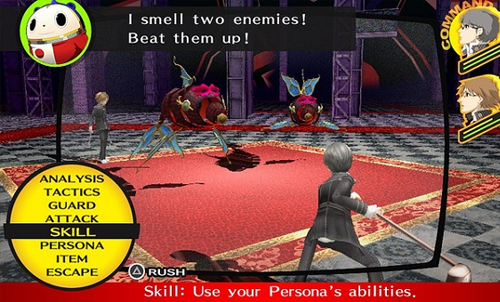
Let’s talk about grinding for a minute. I don’t like it and haven’t since I was a teenager. Now, I avoid it like the plague. And yet, it doesn’t really bother me in Persona. Since the game is portable, playing it in short bursts meshes extremely well with battle system and grinding, really, lost a lot of the monotony it might have had on a full console.
Graphically, the game looks great on the Vita’s OLED screen. I especially liked how the dialogue brought high-res art to the forefront drawing the eye from the actual graphics. The game looks great, don’t get me wrong, but during these dialogue sequences, the characters aren’t doing much, so the transitions between character art add some extra movement. The audio in the game is also great. The music really sets the mood and is about pitch perfect for tracks you’ll hear over and over through the game’s 40+ hour runtime.
So for all of these things that I liked about it, what didn’t I like? Well, put simply, the game takes too long to get into. The first few hours are spent mainly clicking through dialogue as the story sets up. It’s all good and I enjoyed it, but after a while I really just wanted to start playing. The game is also huge. I can’t take points for this since that fact is also one of the game’s biggest selling points, but played in short bursts, it will likely take quite a while for the commuter-player to see it all the way through. In that area, it comes down to taste. JRPGs are known for their length, however, and P4G packs an epic scope.
If you have a Vita and are a fan of RPGs, you owe it to yourself to play Persona 4 Golden. There is nothing quite like it yet available on the handheld and it’s rightfully held up as a beacon of what the system needs more of. Without a doubt, this is a recommended purchase.
| Final Score: 9 out of 10 |
|---|
| Pros: Story, character authority, depth of options, persona collecting, classic and strategic combat |
| Cons: Long set-up, could be a little overwhelming at first, some poorly delivered lines |



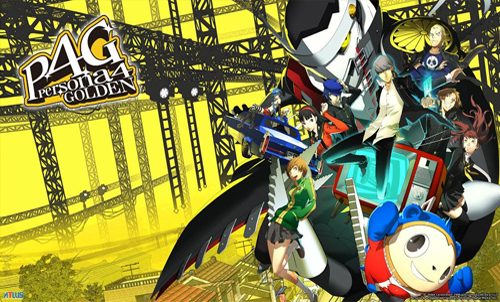

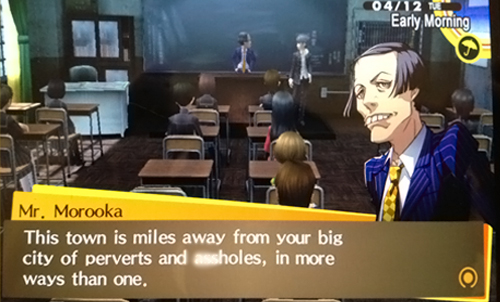
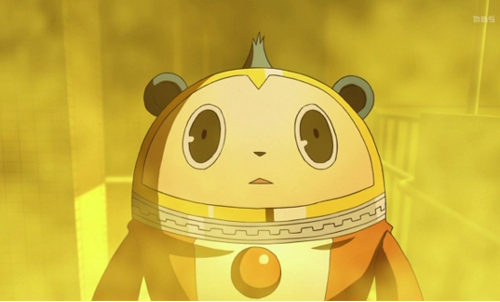
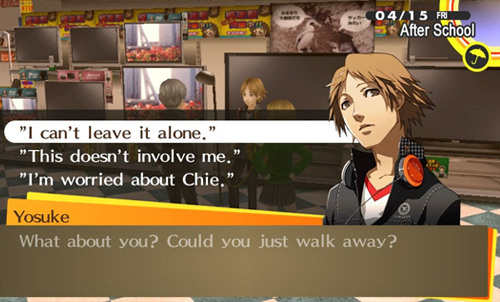


2 pings
Updates and Upcomings; SimCity Owners: Grab Your Free Game From EA |
March 19, 2013 at 3:14 pm (UTC -5) Link to this comment
[…] in the industry but I don’t think that’s the case so much. I started this with Persona 4 Golden and I plan to continue it with SimCity next […]